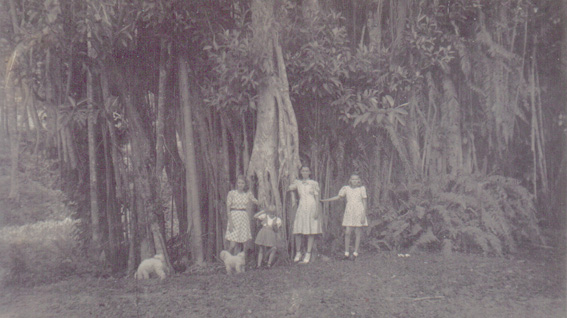Dutch a forbidden language
My father found it too dangerous for my mother and Jansje to stay with him at Sumber Sewu, because there were still small groups of Australian, English and Dutch military fighting in the mountains in East-Java against the Japanese troops, nevertheless the fact that the Dutch East Indies government and Army had surrendered .
My mother and Jansje could stay at our boarding-school, there were small guestrooms.
We all stayed inside the building, only the Indonesians working for the nuns went outside to do the shopping.
A few days later we received the order that all Dutch schools in Indonesia had to be closed down, so several parents came to take their daughters from our boarding-school. The school looked empty and abandoned, we all felt very sad, our happy schooldays were over.
At the same time all the Dutch newspapers and magazines were stopped so we received hardly any news at all. Also on the radio’s there was only news in Malay or Japanese.
Dutch became a strictly forbidden language. Luckily we had a huge library at school so I had lots of books to read in those days.
A few weeks later my father phoned my mother and said that we could all four of us, come back to Sumber Sewu, he had heard that Malang was no longer a safe place for us to stay.
I was really very happy to be back home. Rasmina and Pa Min were happy to have my mother back again. There was absolutely nothing to fear on the plantation, the Indonesians on the plantation were nice as ever and we didn’t see any Japanese soldiers around.
Indeed we were safer at Sumber Sewu. Life began to feel like a vacation, I started walking with my father again and visited the kampung ( Indonesian township) and since we had no more newspapers to read, I started reading several books from my parents. I was allowed to go out horse riding but had to stay close to the house.
And then Cora came to stay with us. She was also from our boarding-school, but I didn’t know her, she was from the training-college. Cora was happy that she could stay with us and she liked the way life went on at Sumber Sewu. In the meantime she helped Henny with her school work since we had taken all our schoolbooks with us. And she helped me at lot with my English, French, history, geography, mathematic and physics . We were very grateful!
Cora and I became friends, she was a very nice person.
We received a Japanese flag, together with the order that the flag had to be respected and had to hang in the garden in front of our house. It became Pa Min’s duty to run up the flag every morning and bring her down every evening before the sun went under.
Karto, the head-foreman, came to my mother with a man who lost one finger. The poor man came from another plantation where nobody could help him so he went to Sumber Sewu.
My mother could stop the bleeding and put some tincture of iodine on the wound against infection and then a bandage to keep the wound clean. She told him to come back to change the bandage now and then. Then she asked him how this had happened, the man started crying and said “the Japanese”. Karto told my mother that the man had stolen some food and then a Japanese soldier had chopped his finger off.
My father received no longer his salary, just like all the other Dutch, British, Americans and Australians, living in Indonesia. All our bank accounts were blocked., no one was allowed to come even near their own money.
My father received just a little bit of money from the firm he worked for, this money was brought secretly from Surabaya to my father’s boss and then to the employees on the plantations. My father said that we had to eat what the Indonesians eat, meaning that Dutch or other European meals were no longer on the table.
We still had rabbits and eggs to eat, my mother and Pa Min had planted, long before the war, several vegetables in the kitchen garden, and we had many fruit trees.
Life was not too bad really, but…it wouldn’t stay that way.

From right to left, Henny, Cora, Jansje and I

